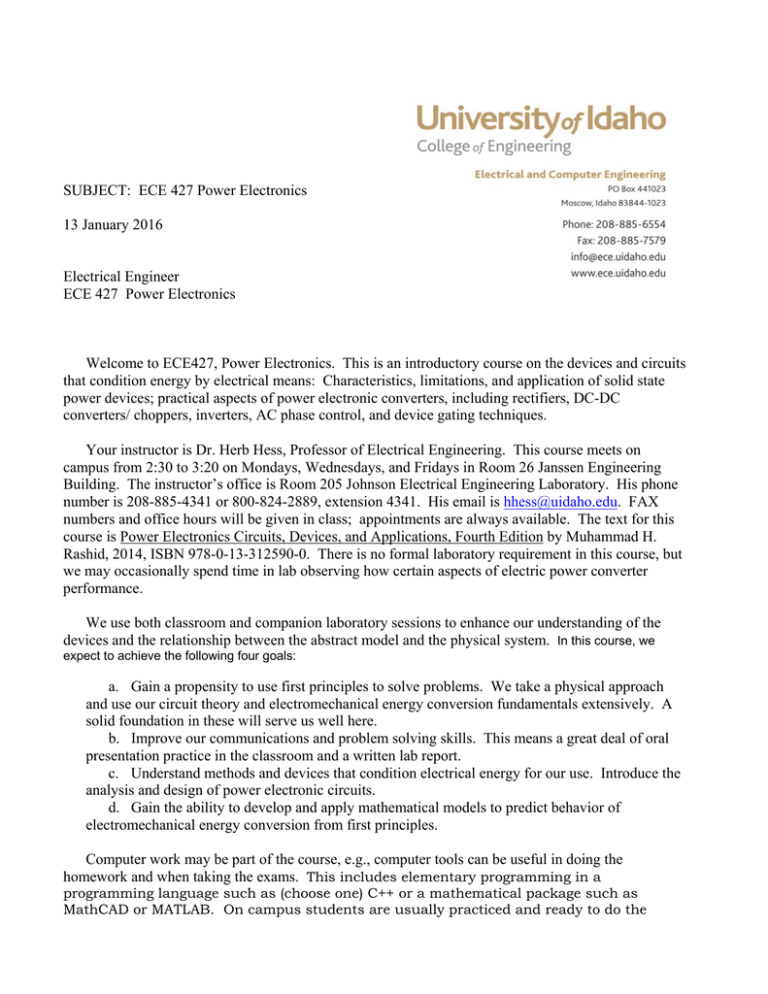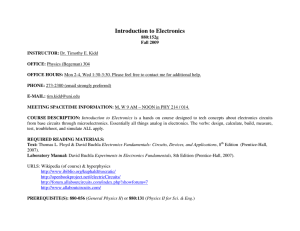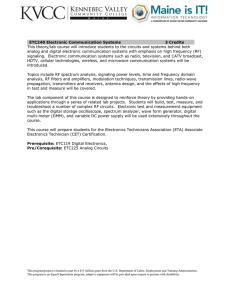SUBJECT: ECE 427 Power Electronics 13 January 2016 Electrical
advertisement

SUBJECT: ECE 427 Power Electronics 13 January 2016 Electrical Engineer ECE 427 Power Electronics Welcome to ECE427, Power Electronics. This is an introductory course on the devices and circuits that condition energy by electrical means: Characteristics, limitations, and application of solid state power devices; practical aspects of power electronic converters, including rectifiers, DC-DC converters/ choppers, inverters, AC phase control, and device gating techniques. Your instructor is Dr. Herb Hess, Professor of Electrical Engineering. This course meets on campus from 2:30 to 3:20 on Mondays, Wednesdays, and Fridays in Room 26 Janssen Engineering Building. The instructor’s office is Room 205 Johnson Electrical Engineering Laboratory. His phone number is 208-885-4341 or 800-824-2889, extension 4341. His email is hhess@uidaho.edu. FAX numbers and office hours will be given in class; appointments are always available. The text for this course is Power Electronics Circuits, Devices, and Applications, Fourth Edition by Muhammad H. Rashid, 2014, ISBN 978-0-13-312590-0. There is no formal laboratory requirement in this course, but we may occasionally spend time in lab observing how certain aspects of electric power converter performance. We use both classroom and companion laboratory sessions to enhance our understanding of the devices and the relationship between the abstract model and the physical system. In this course, we expect to achieve the following four goals: a. Gain a propensity to use first principles to solve problems. We take a physical approach and use our circuit theory and electromechanical energy conversion fundamentals extensively. A solid foundation in these will serve us well here. b. Improve our communications and problem solving skills. This means a great deal of oral presentation practice in the classroom and a written lab report. c. Understand methods and devices that condition electrical energy for our use. Introduce the analysis and design of power electronic circuits. d. Gain the ability to develop and apply mathematical models to predict behavior of electromechanical energy conversion from first principles. Computer work may be part of the course, e.g., computer tools can be useful in doing the homework and when taking the exams. This includes elementary programming in a programming language such as (choose one) C++ or a mathematical package such as MathCAD or MATLAB. On campus students are usually practiced and ready to do the SUBJECT: ECE427 Power Electronics 13 January 2016 Page 2 computer work. Often, Engineering Outreach students are not as well-versed in a math package. We have prerecorded videos to help you begin to use your choice of math package. In this course, we offer additional opportunities to get up to speed. Throughout the homework, there will be escalating occasions to learn by doing. There are two course websites. The Engineering Outreach (EO) Portal web site, available to EO students, provides the videos, copies of all handouts and slides, and homework. On the web site http://www.ee.uidaho.edu/ee/power/ECE427/, we will post a copy of each homework, take-home exams, and respective solutions at an appropriate time. Exam dates are listed in the syllabus. We use a variety of formats: evening, in-class, and take-home. Due dates for homework and exams will be provided in writing on the first page of each assignment and exam. Engineering Outreach due dates are the same as oncampus due dates. The course is video recorded this semester. Videos should be available on the Engineering Outreach website within a few hours of the end of the class session, generally no later than 5pm Pacific Time. Outreach students are expected to keep pace in the course. Due dates for homework and exams will be given in writing at the top of every assignment. There is no difference in expectations and timing for either on-campus or Outreach students. On the other hand, we do realize that people have lives; There are occasions wherein an extension of time is appropriate. This is one of the rare occasions where forgiveness is not easier to obtain than permission. Incomplete grades for the course will only be awarded as authorized in the university general catalog. Again, welcome to ECE427. I look forward to learning from you while helping you become a better engineer and build confidence for the rest of your schooling. Sincerely, Herbert L. Hess Your Professor

